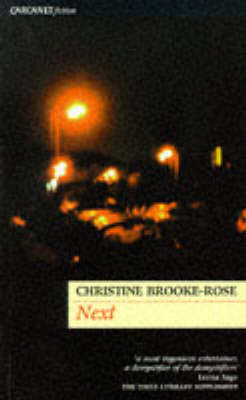Carcanet fiction
1 total work
Next is a murder mystery. It is also a harrowing chronicle. Christine Brooke-Rose creates the language, and through that language the world, of the London homeless. It is a world of dispossession, and those who live within it make it habitable as best they can. They have nothing: Next omits the verb `to have' and all that follows from it. When a homeless character is alone, the word `I' only emerges in conversation, the word `my' not at all. The prose itself dissolves or `wanders' on the page when a character moves alone, unconfined by conversation or relationship. This is not a story of abject isolations. The voices become those of real people, and Brooke-Rose reflects their accents in the phonetic transcription for the different levels of `Estuarian' dialect some of them speak. The reader is compelled to go slowly, to read aloud in order to hear the voices, and thus to experience them on the palate in the most literal way. The fact of language is the beginning of hope. The alphabet theme runs through the book: there are 26 characters, each name a letter of the alphabet. Ten of these are in the street and their names spell QWERTYUIOP. One character tries to teach another to read.
Next is written -- like all of Brooke-Rose's novels --in `free direct speech', a tellerless tale which contains only what hits the consciousness of a character, whether thought or speech. The tale passes from character to character without a break, only the consciousness and inflection indicating the transitions. The homeless seem to many of us an anonymous mass, until we get to know them from within.
Next is written -- like all of Brooke-Rose's novels --in `free direct speech', a tellerless tale which contains only what hits the consciousness of a character, whether thought or speech. The tale passes from character to character without a break, only the consciousness and inflection indicating the transitions. The homeless seem to many of us an anonymous mass, until we get to know them from within.
